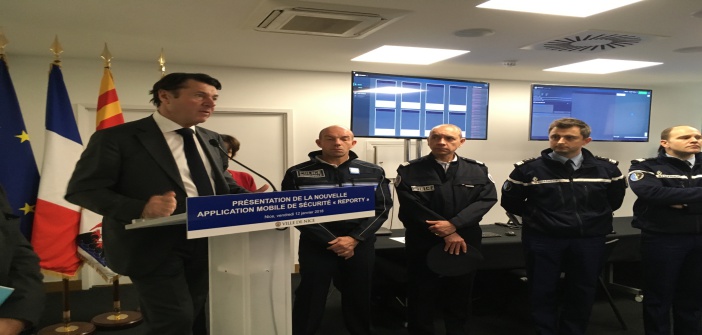This morning, the new Reporty mobile security application was presented at the Nice City Hall. The presentation was attended by Christian Estrosi (the mayor of Nice), Denis Mottier (Commander of the Alpes Maritimes Gendarmerie Company), and Squadron Leader François Cordet (Deputy Commander of the Nice Gendarmerie Company and head of the CIC of the national police).
Also present were Mr. Mochet Leone, the engineer from the Reporty company, and representatives of the municipal civil security reserve.
“A first in our country” and the first French community to experiment with the Reporty security application. Christian Estrosi is proud. For a long time, he has been committed, alongside his municipal deputies, to making the city of Nice the smart city of tomorrow.
An intelligent city, capable of providing answers to the services and uses of the city’s practices, notably by offering complementary services. This morning, one of the complementary services was thus presented in the field of security.
Because the risk 0, says Estrosi: “does not exist”, which is why he wants to raise awareness among his population about today’s threats. For Mr. Estrosi, “the more a population is concerned, the more it is involved.”
During his last trip to Tel Aviv, he met with the leaders of the Reporty company. A startup that develops an application focused on citizen actions, integrating a wide range of high technologies and holding 7 patents.
What is the application for?
This application allows for a video call and real-time connection between citizens and an emergency and security service, as well as municipal services. It enables, from a smartphone, with a simple press of the phone, to send, via the application, the video of the incident: misdemeanors (graffiti, noise disturbances, incivility…) or a critical situation (theft, assault, fire, floods) in high quality to the urban supervision center.
The application then identifies the caller, geolocates them before accessing data that may be useful in case of rescue, to communicate with the operator via instant messaging.
Similarly, this application also allows for a distress call “an isolated person who would be a victim of discomfort, a fall, for example.” This allows the operator to better manage the situation, to quickly address the event by deploying the appropriate service on the ground.
The city’s services can therefore optimize their reaction times and more easily determine the allocation of resources to be implemented. For Christian Estrosi, “This application transmits reliable and precise information quickly, efficiently, and discreetly to the municipal services.”
Yes, but abuses can occur…
This is the criticism made by Patrick Allemand, one of the municipal councilors not informed of the said event. For the socialist councilor, the idea of making an audio or video call that will be transmitted in real-time to the urban supervision center from your mobile phone if you witness an assault or incivility is concerning.
This initiative seems to Patrick Allemand like organizing a generalized whistleblowing process, the limits of which are unknown. Indeed, the city agents each have their sensitivity, but the possibilities of reporting are numerous, notes the memo sent by the information systems department on January 10. This could range from theft or assault to noise nuisances, graffiti, gatherings of individuals, or disturbing vehicles.
He denounces the pressure exerted on certain agents who have a professional mobile phone in this same memo of January 10 and who had not yet replied. The memo states: “As you have a professional mobile phone, you are one of the privileged players to carry out this new large-scale operation.” “Also, if you have not yet volunteered, we kindly ask you to sign up!”
The town hall exonerates itself
“There is no question of intruding into private life inside homes” and “we will be very attentive to that,” declares Christian Estrosi before justifying further: “we have declared this experiment to the CNIL. It was validated in its experimental phase, which does not mean it will be validated in its final phase.”
For the mayor of Nice, it is necessary to demonstrate that in this experimental phase, the town hall does not take the risk of touching on sensitive subjects.
Furthermore, the transmission is done only in streaming, so nothing is recorded on the caller’s smartphone.
Only the urban supervision center has access to the videos for 10 days, the time to make judicial requisitions with magistrates or judicial officers.
Users of the application are given a code of ethics manual, and anyone who does not comply would have the application removed from their smartphone. The user will be blacklisted in case of misuse of the application.


